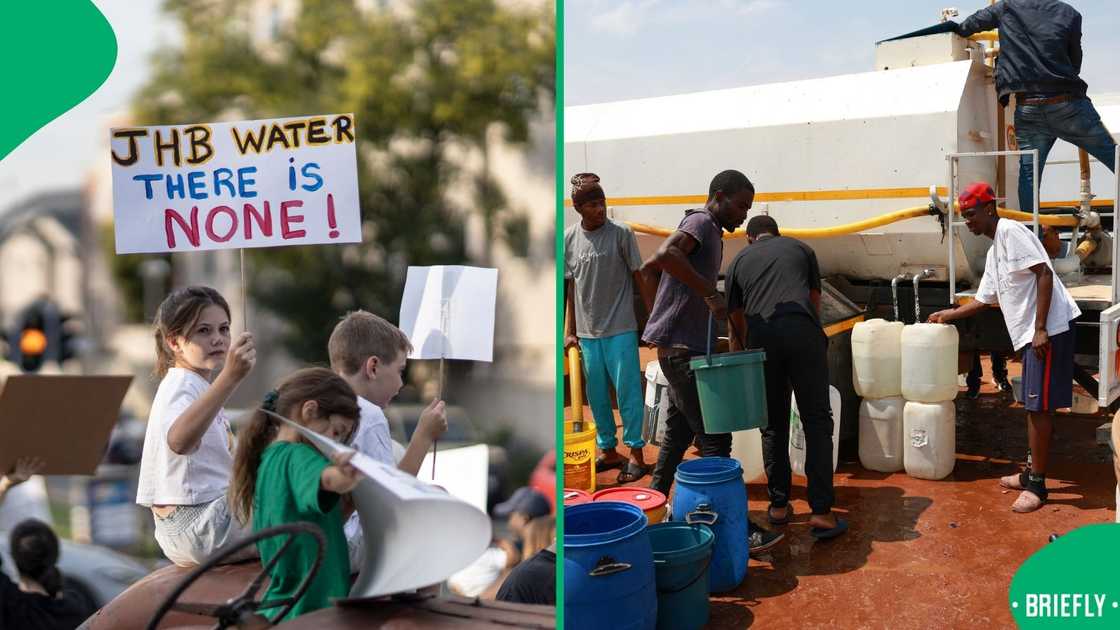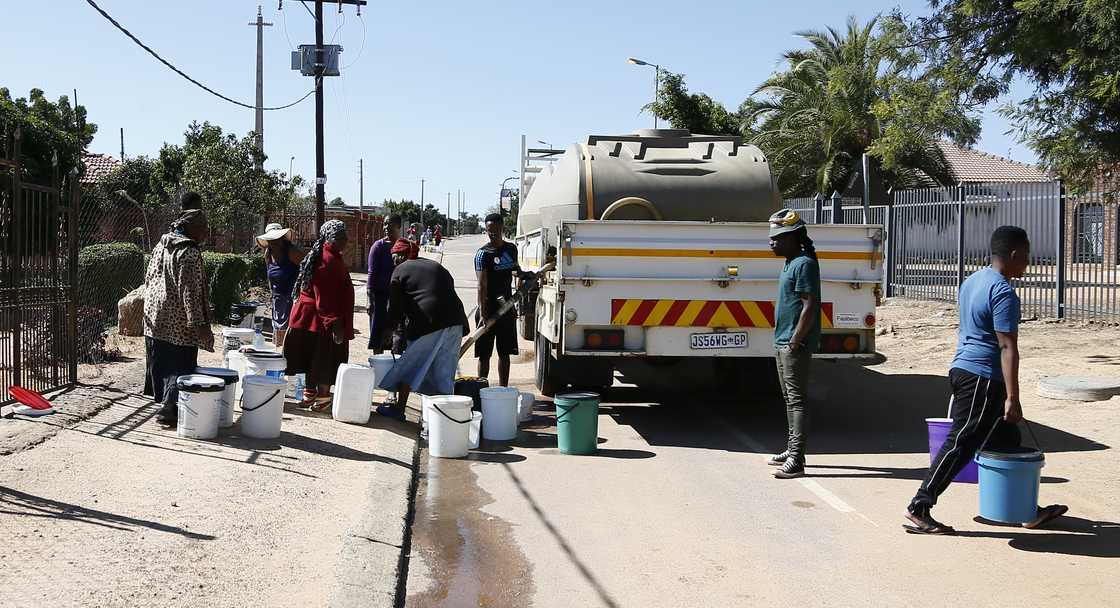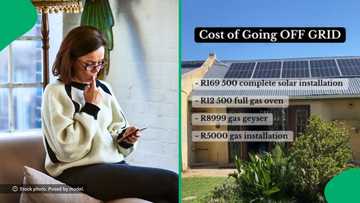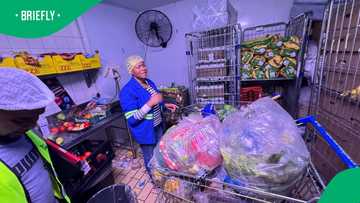Johannesburg’s Water Crisis Worsens, Professor Weighs In As DA Calls for Dissolution of Water Board
- Johannesburg Mayor Dada Morero promised that water would be restored to areas within seven days
- The Democratic Alliance called for the board of Johannesburg Water to be dissolved in the wake of the crisis
- A UNISA professor weighed in on the current situation and how the city could turn it around
Don't miss out! Join Briefly News Sports channel on WhatsApp now!
Briefly News journalist Byron Pillay has spent a decade reporting on the South African political landscape, crime and social issues

Source: Getty Images
The City of Johannesburg's (CoJ) water issues continue to worsen, with many residents unsure of whether they will continue to receive the precious resource.
Residents have been plagued by an erratic supply, and constant water cuts, with CoJ's promises often failing to materialise.
With the problem ongoing and even escalating, Briefly News looks at some of the most recent developments in the crisis.
PAY ATTENTION: Briefly News is now on YouTube! Check out our interviews on Briefly TV Life now!
Dada Morero promises solutions in a week
During a visit to Rand Water’s Eikenhof pump station on Friday, February 14, Mayor Dada Morero apologised and assured residents that water would be restored to all areas within seven days.

Read also
Tragedy at Uvongo Falls as woman drowns, floating debris and strong currents hamper rescue efforts
His promise comes after weeks of no supply in some areas of the city. The mayor has often been criticised for being largely absent during the ongoing crisis. The last time he made a public appearance to address the water issues was in December 2024.
”We are now committing ourselves to the residents of Johannesburg that in the next seven days, everyone will have water,” Morero said.
The mayor blamed the water issues on power cuts experienced by City Power and eMfuleni Local Municipality. Morero also said that increased demand for the resource was putting pressure on the system.
Rand Water warns of system collapse
Morero's comments were echoed by Rand Water, who warned of a potential system collapse.
The entity noted that it could be forced to introduce restrictions to limit the supply.
Rand Water has given Tshwane, Joburg and Ekurhuleni the chance to introduce restrictions from their sides to help manage consumption before the situation worsens.
An expert previously spoke to Briefly News, saying that Gauteng's water crisis could be resolved if stakeholders worked together to end it.
Political parties call for urgent action
With the situation reaching new levels of frustration, the Democratic Alliance (DA) in Johannesburg has called for the board of Johannesburg Water to be dissolved.
The party stated that Johannesburg Water’s inability to keep water in its reservoirs meant that resident's taps were dry once more.
"Our call for the dissolution of Johannesburg Water’s board, if complied with, would mean that members of the board can be replaced with qualified, merit-based individuals who understand water engineering and reticulation," the party said.
The party also noted that the infrastructure was outdated, but salaries increased from R840 million to R1.5 billion. The DA also lodged a complaint at the South African Human Rights Commission (SAHRC) about the appalling situation.
"The SAHRC needs to hold Johannesburg Council accountable and ensure immediate relief for residents affected by 28 out of 61 reservoirs and towers that are critically low or completely empty," Jack Bloom, Member of Parliament for the party said.
Their concerns were largely echoed by the Economic Freedom Fighters (EFF) who condemned the ongoing crisis.
For years, the people of Johannesburg have suffered through recurring water cuts, erratic supply, and growing uncertainty regarding access to this basic human right.
"This is not because residents are using too much water, it is because the infrastructure is old, dilapidated, and neglected.
"The City's water pipes, reservoirs, and pump stations have been allowed to collapse due to poor maintenance, lack of investment, and the deployment of incompetent ANC cadres who are more interested in looting state resources than serving the people," the EFF said.
The party also stated that the excuse of overconsumption was a lazy one, and called on the Joburg Water to provide an emergency turnaround strategy.
High Court affected by water cuts
As the situation escalates, business and government entities also suffer the effects. On Thursday, 13 February, the Gauteng High Court was forced to halt proceedings due to the ongoing water shortages.
“Affected parties will be contacted regarding alternative arrangements for all matters scheduled on the court roll for the day.” the court informed residents.

Source: Getty Images
UNISA professor weighs in on water woes
Professor Richard Meissner from UNISA weighed in on the issue but remained confident that the government could turn it around.

Read also
Johannesburg gets rushed clean-up for G20 meetings, SA jokes it only happens when visitors arrive
He explained that there was often an urban bias in the water sector’s political landscape because most of the population lived in urban areas. He noted that despite the challenges the city currently faces, it still had better access to the precious resource than the more rural areas.
"The financial resources are concentrated in urban areas, and by default the electorate that can give a political party the mandate to form a government during and after an election. From the research I’ve conducted in the past, people in urban areas have better access to water than those living in the peri-urban or rural areas," he said.
Professor Meissner noted that the government could focus more on the cities, as rural areas often found alternative means of sourcing their own water.
"In deep rural areas, people supply their own water resources without any assistance from the government, so we must acknowledge that not in all areas it is possible for any sphere of government to deliver water."
President's speech addresses water crisis
Briefly News reported that President Cyril Ramaphosa unveiled plans to tackle the water crisis plaguing the country.
The president noted that funds were set aside to deal with the crisis and ensure everyone had access to the resources.
Ramaphosa made the promise during his State of the Nation Address on 6 February 2025.
Source: Briefly News




